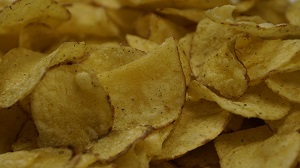Food industry already successful in cutting acrylamide - expert comment
Release Date 23 January 2017

Dr Stephen Elmore, Senior research fellow at the Flavour Centre, University of Reading said:
“Acrylamide has been classified as ‘probable carcinogen’ as it has been shown to cause cancer in laboratory animals. However, as yet no studies have established that it is a cause of cancer in humans. The presence of acrylamide in some oven-cooked, grilled and fried starchy foods was discovered in 2002. Since then the food industry, regulatory bodies and research groups (such as University of Reading) have successfully worked together to devise strategies to reduce acrylamide levels in these foods.
“A visible example of this collaboration is the progressive reduction in the colour of shop-bought potato crisps during this time. Acrylamide has been widely discussed in the media but most of the emphasis has been on commercial food products. The extent of acrylamide formation in home cooked foods is difficult to evaluate but it is advisable not to overcook roasted, baked and fried starchy foods. The FSA recognise there is a lack of awareness in the public about acrylamide and in the recent publication on their website are expanding the advice, given previously, about acrylamide formation in home-cooking. This advice is clear and well presented."